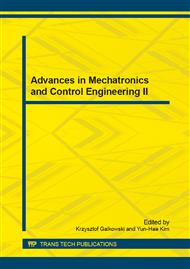p.2331
p.2335
p.2339
p.2343
p.2347
p.2351
p.2359
p.2363
p.2367
An Adaptive Assembly Scheduling Approach in Knowledgeable Manufacturing
Abstract:
To address the uncertainty of production environment in aircraft engine assembly, an adaptive optimization scheduling algorithm is designed for an aircraft engine assembly line in knowledgeable manufacturing. A Q-learning adaptive scheduling model of aircraft engine assembly is built on the objective function of minimizing earliness penalty. Simulation experiments indicate that the proposed algorithm outperforms other scheduling rules much. Especially, better results are generally achieved with the increase in number of engines to show good adaptive performance.
Info:
Periodical:
Pages:
2347-2350
Citation:
Online since:
October 2013
Authors:
Keywords:
Price:
Сopyright:
© 2013 Trans Tech Publications Ltd. All Rights Reserved
Share:
Citation:


